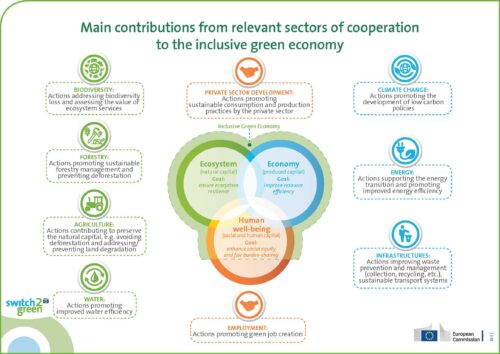The European Commission Directorate General for International Cooperation and Development (DG DEVCO) launched the SWITCH to Green Flagship Initiative aiming at facilitating the transition to an inclusive green economy that generates growth, creates decent jobs, and helps reduce poverty. The Flagship initiative links complementary programmes to improve the overall coherence, coordination and visibility of existing and future EU-funded international cooperation initiatives on green and circular economy.
The complementary programmes linked in the SWITCH to Green Flagship (S2G) Initiative contribute to implement the 2030 Agenda for Sustainable Development, in particular goal 12: “Ensuring sustainable consumption and production (SCP) patterns”. The Initiative should also be seen in the context of the EU action plan on circular economy, which acknowledges the global dimension of the circular economy and foresees EU cooperation with international organisations and other interested partners as part of the global efforts to reach the 2030 Sustainable Development Goals.

The S2G Flagship Initiative builds on several initiatives, in particular the SWITCH regional programmes: the SWITCH-Asia programme, the SwitchMed programme, and the SwitchAfricaGreen programme. Further EU funded programmes linked to the Flagship are the SWITCH to circular Calue Chains, Eco Business Africa and the Green Economy Coalition dialogues.
Among others, the Flagship aims to strengthen the linkages between macro-level initiatives -such as the UN Partnership for Action on Green Economy – and micro-level interventions -such as the green business components of the SWITCH regional programmes- in order to reinforce synergies and create stronger enabling environments for green economies.
To support the objectives of the SWITCH to green flagship initiative, the SWITCH to Green Facility was set up to provide technical assistance to staff in the European Commission’s Directorate-General for International Cooperation and Development (DG DEVCO), to EU Delegations and to government officials in developing countries.
Who is who?
EU actors
The European Commission’s Directorate-General for International Cooperation and Development (DG DEVCO) is responsible for designing and implementing EU international cooperation and development policy which, among others, commits the EU to “promote a ‘green economy’ that generates growth, create jobs and helps reduce poverty”.
DG DEVCO works closely with other Commission services responsible for thematic policies, as well as with the European External Action Service (EEAS) and Commission services on external action. The EEAS is responsible for running 139 EU Delegations and Offices operating around the world, representing the European Union and its citizens globally. The EU Delegations play a key role in presenting, explaining and implementing EU’s foreign policies.
International organisations
The United Nations Environment Programme (UNEP) plays a prominent role in promoting the transition to a green economy, by serving the Ten-year Framework Programme (10YFP) Secretariat on the one hand, and by being involved in the implementation of the SWITCH regional programmes on the other.
The UN Partnership for Action on Green Economy (PAGE) brings together five UN agencies – UNEP (United Nations Environment Programme) UNDP (United Nations Development Programme), UNIDO (United Nations Industrial Development Organization), ILO (International Labour Organization), UNITAR (United Nations Institute for Training and Research) – to provide assistance to interested countries in developing, adopting and implementing green economy policies and strategies, as well as assisting countries in achieving and monitoring the Sustainable Development Goals.
Partner Countries
The green economy transformation is at least as important for developing countries as it is for developed economies. Developing countries face the same necessity to improve the environmental sustainability of their economy and mitigate the economic costs of further environment degradation, which, if unaddressed, could lock them further into poverty. At the same time, more efficient resource use, and presence on the rapidly growing global environmental goods and services market are important for developing countries’ competitiveness and growth. The SWITCH to green initiatives covers Africa, Asia, Latin America, and EU neighbouring countries.
Private sector entities
As underlined in the 2014 Communication from the Commission on the role of the private sector in international development, the private sector is expected to play a key role in driving the transformation to the green economy. Adopting environment-friendly business practices is already widespread, with many commercial and economic opportunities making such a process attractive to the private sector. The private sector acknowledges the rapid growth of the environmental goods and services global market, the prospects for savings from resource efficient production processes, for improved reputation, and increased security of supply chains resulting from the procurement of sustainably produced raw materials. It is therefore responding positively to this challenge, with relevant initiatives being important drivers of green economy transformation in many countries.

